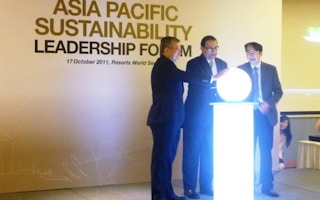The Singapore Business Federation (SBF) signed three agreements at a conference last Monday to give Singapore businesses and industries better access to expertise, financing opportunities and global networking on clean-tech and green business initiatives.
“The MOUs (memorandums of understanding) aim to connect Singapore companies to international networks to build technological and financial capabilities, as well as create market access to green growth opportunities in both Europe and the Asia Pacific,” said Singapore’s Minister in the Prime Minister’s Office, Mr S Iswaran, who gave the opening address of the Asia Pacific Sustainability Leadership Forum.
SBF signed an MOU with the Sumitomo Mitsui Banking Corporation (SMBC), one of Japan’s largest banking groups. SMBC and SBF will work together to create new business partnerships between Japanese and Singaporean companies.
SMBC’s Asia Pacific head, Masayuki Shimura, told reporters at a press conference after the ceremony that the bank often received requests from Singapore firms to introduce them to new technology companies in Japan.
The MOU formalises SMBC’s networking role, and also states the bank’s intention to provide consultation and financial analysis on SBC member clean-tech projects.
Ho Meng Kit, who is chief executive of SBF, added that Singapore companies provided Japanese companies with access to and knowledge of local markets.
“Through SMBC’s financial network, we will be working to promote the growth of this sector through forging alliances, fast-tracking commercialisation of sustainability solutions, and facilitating knowledge and technology sharing,” he said.
A second agreement, a letter of intent signed by SBF and the World Council for Sustainable Development (WBCSD), announced the creation of a Singapore chapter of the WBCSD.
WBCSD, a chief executive-led coalition of 200 multi-national companies with collective revenues of about US$7 trillion, has a network of 60 regional councils that promote sustainability within the private sector.
Constant van Aerschot, WBCSD’s advisor to Singapore, said that Singapore companies would be able to plug into best practices of a large global network. WBCSD has 20 years of experiences and a wealth of know-how and research, he added.
Mr van Aerschot told Eco-Business on the sidelines of the event that the new Singapore chapter would be launched when 6 to 10 founding members were signed up. He noted that he and SBF were in talks with eight to 10 companies already, and that he expected the launch to take place in June or July of next year.
SBF’s Mr Ho added that some of the Singapore companies involved in discussions included Singapore conglomerate Keppel Corporation, engineering firm Sembawang and technology company ST Engineering.
WBCSD projects from which member companies will benefit include a landmark study on successful ways of engaging employees into a sustainability-focused corporate culture, and projects to test and predict the effects of government policies on energy efficiency in the building sector.
WBCSD’s Mr von Aerschot said that having the regional chapters allowed network members to choose the solutions and strategies that were relevant and appropriate for their region.
The third agreement was an MOU signed by the Singapore Sustainability Alliance (SSA), an initiative hosted by SBF to support the Republic’s clean-tech industries, and the Danish agency, Copenhagen Capacity, to set up networking and study trips for Singaporean businesses and students.
Copenhagen Capacity is a Danish agency that encourages investment and collaboration with the capital city’s clean-tech industries. The organisation plays a leadership role in the International Cleantech Network, which promotes the advancement of sustainability related technologies and includes the Singapore Sustainability Alliance among it members.
Widely recognised as one of Europe’s greenest capital cities, Copenhagen has pledged to become carbon neutral by 2025. Among the city’s sustainability achievements are an integrated waste management system, combined heat and power plants for buildings, and an environmentally aware population, with over 35 per cent bicycling to work.
Mariana Lubanski, business development directory of Copenhagen Capacity, said Singapore’s business and academic trips would likely focus initially on the integration of renewable energy into smart grids, water efficiency and transport.
As part of the agreement with SSA, Copenhagen Capacity will support next year’s inaugural International Cleantech Network (ICN) conference, which will be held in Singapore next October in conjunction with next year’s Asia Pacific Sustainability Leadership Forum.

















